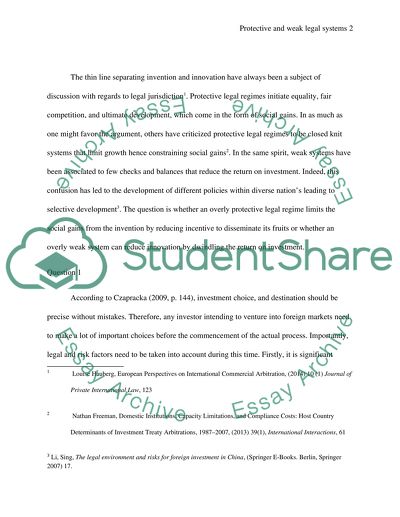Cite this document
(“An overly protective legal regime will limit the social gains from Essay”, n.d.)
An overly protective legal regime will limit the social gains from Essay. Retrieved from https://studentshare.org/law/1697212-an-overly-protective-legal-regime-will-limit-the-social-gains-from-invention-by-reducing-incentives-to-disseminate-its-fruits-while-an-overly-weak-system-could-reduce-innovation-by-failing-to-provide-an-adequate-return-on-investment
An overly protective legal regime will limit the social gains from Essay. Retrieved from https://studentshare.org/law/1697212-an-overly-protective-legal-regime-will-limit-the-social-gains-from-invention-by-reducing-incentives-to-disseminate-its-fruits-while-an-overly-weak-system-could-reduce-innovation-by-failing-to-provide-an-adequate-return-on-investment
(An Overly Protective Legal Regime Will Limit the Social Gains from Essay)
An Overly Protective Legal Regime Will Limit the Social Gains from Essay. https://studentshare.org/law/1697212-an-overly-protective-legal-regime-will-limit-the-social-gains-from-invention-by-reducing-incentives-to-disseminate-its-fruits-while-an-overly-weak-system-could-reduce-innovation-by-failing-to-provide-an-adequate-return-on-investment.
An Overly Protective Legal Regime Will Limit the Social Gains from Essay. https://studentshare.org/law/1697212-an-overly-protective-legal-regime-will-limit-the-social-gains-from-invention-by-reducing-incentives-to-disseminate-its-fruits-while-an-overly-weak-system-could-reduce-innovation-by-failing-to-provide-an-adequate-return-on-investment.
“An Overly Protective Legal Regime Will Limit the Social Gains from Essay”, n.d. https://studentshare.org/law/1697212-an-overly-protective-legal-regime-will-limit-the-social-gains-from-invention-by-reducing-incentives-to-disseminate-its-fruits-while-an-overly-weak-system-could-reduce-innovation-by-failing-to-provide-an-adequate-return-on-investment.


